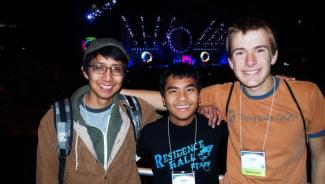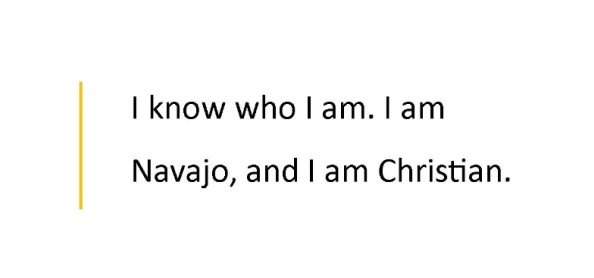Coming Home to Jesus

 Even though I am Navajo, I didn’t grow up in a household that practiced the traditional ways. I was raised believing in God and going to church every Sunday, but I never took any of it to heart. I was just listening to my parents, doing what I was told. I never questioned them or had the urge to search for God on my own. God wasn’t a big deal to me.
Even though I am Navajo, I didn’t grow up in a household that practiced the traditional ways. I was raised believing in God and going to church every Sunday, but I never took any of it to heart. I was just listening to my parents, doing what I was told. I never questioned them or had the urge to search for God on my own. God wasn’t a big deal to me.
Can I Be Navajo and Christian?
But then I went to a Native student conference back in November called Would Jesus Eat Frybread? (WJEF). Several questions asked there intrigued me, being from the Navajo tribe and given the way I was raised. The conference title was the main question posed, and while it may seem like a simple or even comical question, it’s much more complex than you’d think. Another way to ask the question is, “Would Jesus come and sit down with you and eat frybread?” Meaning, “Would he accept you with your culture and your way of life?” This leads to other questions, such as, “Can you use your Native way to worship the Creator?” and “Can you be a Native and Christian?”
One speaker at the conference, Mark Charles, particularly stood out to me when he talked about contextualized worship—being able to modify a cultural worship style so that it honors the Creator and Jesus. Over the weekend, I was able to ask him specifically how to begin the journey to be both Navajo and Christian. I wanted to know if it was really possible to blend church and culture.
He gave me a simple answer using the story of the prodigal son in Luke 15. But since Navajo culture is matrilineal, meaning the authority lies with the grandmother (including authority to re-instate family members into the community), he told me a Navajo version, with a Navajo grandmother and grandson replacing the father and son.
The grandson ventures off into the world away from home, leaving behind his way of life, his land, and his identity. When he returns, he knows he doesn’t deserve to be welcomed and accepted by his family. But his grandmother gives him back everything he left behind as if he’d never gone.
We Navajo Christians are the like the grandson, Mark explained. We left our old way of life—our language, culture, identity, land, and even our families—because we were told that was what was required to follow Christ. We are forced to accept a version of Christianity that is wrapped up in imperialism and in a false theology of manifest destiny. In the end, though, when we return home to Jesus, like the grandmother he gives us back everything good we once had that identified us as both Navajo and Christian.
Through the story I was able to understand how much Jesus loves all people and how enormous and powerful God truly is. It was awe-inspiring to think about the fact that he is everywhere. I had God in a box, but now I know in a much deeper way how big he is.
I fully surrendered my life to Jesus at the conference, and have no doubt that he’s real, powerful, and loving. I know who I am. I am Navajo, and I am a Christian. (Click here to tweet this.) I know that God values my Native worldview, and that he invites me to use my language and culture to worship him. (Click here to tweet this.)
Can God Use Me in His Work in the World?
There was still a problem, though. Even before I became a Christian, I was never comfortable talking to others about my beliefs, even my closest friends. Most of these friends did not believe in God, or were never exposed to him. So I felt that if I all of a sudden started talking to them about God, they would be put off and avoid me. I needed courage to get over this obstacle.
My prayers were answered when I was able to go to Urbana 12. Over 16,000 people were at the conference, which took place in St. Louis, Missouri, from December 27 to 31. This one was different from WJEF, though; Urbana is a missions conference that helps people discern how God wants to use them in his work in the world.
There were two major breakthroughs that happened for me at Urbana. I honestly felt the power of the Holy Spirit when I was (1) praying for the healing of the Navajo reservation and (2) asking God for the courage to express my beliefs to others.
Praying for the Navajo reservation was so powerful. Surrounded by indigenous brothers and sisters in the Native & Indigenous Ministries Lounge, we Navajos took turns praying for specific problems on the reservation. Addiction to alcohol, domestic violence, broken homes, drug abuse—it was all prayed for.
As we prayed, I remembered the work of God’s love in my family—how my father and grandfather, both alcoholics, gave their lives to Christ and never touched alcohol again. I started to think about the fact that if I spread the word of God to others, Jesus can save them. I pictured families being mended, people giving up alcohol and drugs, the end of domestic violence. This thought made me so happy! And God gave me the courage and motivation to spread the word of God after Urbana. (Click here to tweet this.) I’ve shared my beliefs with coworkers and friends, and invited people to my Christian fellowship.
My experiences at both conferences and the combination of speakers like Mark Charles and David Platt telling us to make radical changes in our life has increased my trust in God. Now I’m truly home: I’ve given my life to Jesus and I’m not afraid to express my beliefs. (Click here to tweet this.) God has so much in store for me this year, and I can’t wait to use my abilities, my education, and even my culture to spread the word of God.
Daniel Begay is a Navajo student studying chemistry at Northern Arizona University. He is also involved with Onetribe, a Native student ministry on campus. Daniel grew up on the rez and plans to go back to help the community and the environment after he graduates.



